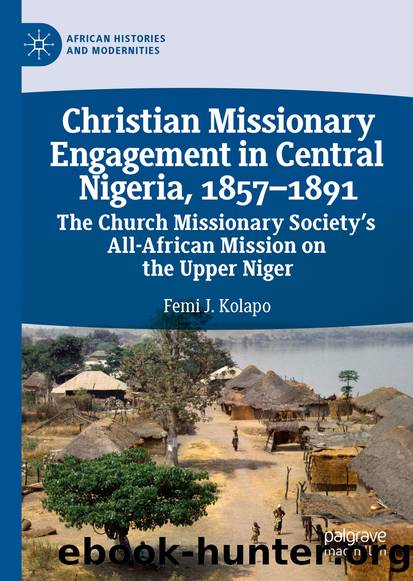Christian Missionary Engagement in Central Nigeria, 1857â1891 by Femi J. Kolapo

Author:Femi J. Kolapo
Language: eng
Format: epub
ISBN: 9783030314262
Publisher: Springer International Publishing
Initial Political Responses to Missionary Presence
The initiation of Crowtherâs CMS Upper Niger Mission and its evangelizing program occurred at the same time asâand clashed withâthe consolidation phase of the expanding Jihadist Nupe state. The inauguration of the mission among the Igala of Idah, neighbor to the Nupe on the southeast side of the Confluence, on the contrary, corresponded with the political decline of that state. The CMS Mission among the Igala was thus begun in a context fraught with acute political and diplomatic sensitivity by the rulership of the Igala kingdom.
The Nupe found it politic to develop and manage a beneficial relationship with the British government through its friendship with the Christian missionaries and with British consular representatives, who, for a very brief period, were occasionally present at Lokoja. The Nupe rulers were not insensitive to the political implications of a successful Christian missionary enterprise within the boundary of their state. They were neither unaware of the constraints it might pose to their territorial expansion and the challenge it might present to its economic and fiscal prerogatives over subjected peoples in territories it claimed to be under its jihadist jurisdiction. Hence, the earlier permission given by Emir Masaba to Crowther to establish his mission at Rabba was rescinded and the buildings which he had erected and which made up the first CMS Mission station in the Upper Niger were pulled down. He was told to move his mission to the southern peripheries of the state at Lokoja, which until then had not come under Nupeâs domain.51
The Nupe rulership was abreast of information on international relations between the European powers and societies of the Mediterranean, North Africa, and the Middle East. They specially followed the news of the problems in the nineteenth century faced by Turkey, Egypt, Morocco, and Tunisa in granting, under imperialist pressure, extra-territorial privileges to European Christian nations. In their discussions with British explorer Hugh Clapperton in the 1820s and with W. B. Baikie and Crowther in the 1850s through 1870s, the leadership of the Sokoto Caliphate and the emirs and leaders of the Bida emirate, respectively, showed a keen awareness of the dangers lurking underneath any type of unbounded diplomatic relation with the Europeans. This, in addition to internal factional politics, probably led the Nupe leadership to quickly do the reassessment that caused them to change their earlier welcome policy regarding Crowtherâs missions. The duo of Emir Usman Zaki and Emir Masaba, the latter then the heir presumptive, had assured Crowther and Baikie in 1858 that Rabah, the deserted erstwhile Nupe capital, was going to be reconstructed and resettled once again as the capital of the Nupe emirate as the long wars of Nupe had finally ended. However, they seemed to have realized that having a Christian missionary group ensconced right in the capital would project a very unfavorable image of a jihadist emirate.52 It is, thus, understandable that the Nupe leadership would rescind the permission that Crowther had earlier allowed Crowther to build his mission at Rabba.
Download
This site does not store any files on its server. We only index and link to content provided by other sites. Please contact the content providers to delete copyright contents if any and email us, we'll remove relevant links or contents immediately.
Evangelism In a Skeptical World: How to Make the Unbelievable News About Jesus More Believable by Sam Chan(197)
The Witness of Preaching, Third Edition by Long Thomas G(155)
Evangelism Without Additives by Jim Henderson(155)
How to Preach a Dangerous Sermon by Frank A. Thomas(150)
Emotionally Healthy Discipleship by Peter Scazzero(148)
Transforming Fellowship: 19 Brain Skills That Build Joyful Community by Chris M Coursey(145)
The Art of Preaching Old Testament Narrative by Steven D. Mathewson(129)
Sermons of St. Alphonsus: For All the Sundays of the Year by St. Alphonsus Liguori(122)
Contagious Disciple Making: Leading Others on a Journey of Discovery by David Watson & Paul Watson(114)
Smart Sermon: How to Preach Intelligent Biblical Sermons that Transform Lives by Reimar Vetne(109)
Captured Fire: The Sunday Homilies, Cycle B by Krempa S. Joseph(104)
How to Write and Preach a Sermon: Practical Advice for the New Preacher by Christopher Bentliff(104)
Reciprocal Missions: Short-Term Missions that Serve Everyone by Steiner Phil & Schuetze DJ(93)
Christian Missionary Engagement in Central Nigeria, 1857â1891 by Femi J. Kolapo(88)
Determining the Form: Structures for Preaching (Elements of Preaching) by O. Wesley Allen(87)
Preaching Better by Ken Untener(87)
Outreach and Renewal by McSherry James(85)
Recovered by Robby Gallaty & Rob Suggs & David Platt(73)
